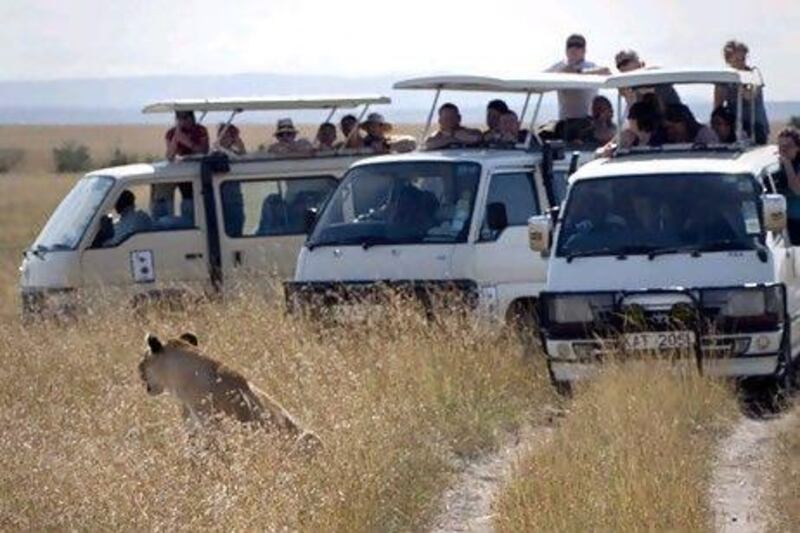The economic links between Kenya and the Gulf date back centuries to when Arab traders travelled to the East African coast.
These days, the trade links between the regions are growing stronger, with the UAE having reclaimed its position as the top exporter to Kenya last year. Yet the connections go beyond trade, with aviation and tourism links between the two countries having become newly strengthened.
The number of flights between Kenya and the UAE are on the rise. Meanwhile, Kenya is increasingly focusing on attracting tourists from the Emirates as its industry reports an overall decline in business this year, dragged down by kidnappings of tourists by Somali pirates and weakness in the euro-zone economy.
The number of visitors to Kenya from the UAE grew by 14.2 per cent in the first quarter of this year compared with the same quarter last year, according to Kenya's ministry of tourism. At the same time, the number of tourists from Italy has declined by 14.3 per cent, with France's numbers down 28 per cent and Germany's off by 7.3 per cent.
Despite the increase in the number of travellers from the UAE, this segment of the tourism market in Kenya still has plenty of growth potential, said Anjali Devani, the managing director of Travel Wild, a travel operator based in Nairobi.
"The [new] flights have made a huge difference," she added. "[Carriers have] increased the capacity for flights and [brought] air fares down".
The total contribution of travel and tourism to Kenya's economy last year was 403.7 billion Kenyan shillings (Dh17.58bn), or 13.7 per cent of GDP, according to the World Travel and Tourism Council.
"Tourism is a very important aspect of Kenyan economy," said Abraham Joseph, the Middle East and Pakistan area manager for Kenya Airways."The flights are also popular among traders from across Africa who travel to Dubai to buy goods."
Mr Joseph said the carrier would be doubling its daily flights to Dubai as soon as the company got the necessary equipment.
UAE airlines are also capitalising on the demand for travel between the regions.
Etihad Airways launched daily flights to Nairobi at the beginning of last month as the Abu Dhabi airline expands in Africa.
Emirates Airline also has direct flights to Kenya's capital from Dubai. Emirates also has flights into Mombasa. Air Arabia, the budget carrier based in Sharjah, also offers a direct service to Nairobi.
In November, the UAE and Kenya signed a double-taxation avoidance agreement, which included the clause that all the UAE's national carriers would be exempt from taxes in Kenya, according to a statement from Wam, the Emirates news agency.
In 2009, Kenya's tourism board opened an office in Dubai.
The UAE is likely to become an increasingly important source of tourists for the country as it tries to diversify the markets it taps for tourists, hoteliers say.
"Last year was a vintage year," said Paul Chaulo, the manager of the Mara Serena Safari Lodge, which is located in the Masai Triangle of the Masai Mara National Reserve and is a luxury base for tourists on safaris.
"But this year, for the whole of Mara, it has been pretty low," he adds, noting that its key markets have been affected by the euro-zone crisis. "In Kenya, we are anticipating the elections - so that has also a little bit affected our business."
Although the Mara is far from the Somali border, some tourists consider Kenya as a whole as unsafe, he said.
Occupancy at the hotel has fallen to about 60 per cent in the first quarter of this year from about 85 per cent in the same months last year. If the destination is marketed well to the Gulf region, Mr Chaulo said, there was significant potential for growth.
"The Middle East is a fast-growing market," he said.
Sarova Mara Game Camp, another luxury safari resort, said the property had an increase in visitors during the unrest in the Middle East and North Africa (Mena) last year, as many travellers opted for holiday destinations outside of the Mena region.
Business has been down so far this year compared with last year, though. But the number of travellers from the Gulf region is growing, said Francis Msengeti, the lodge manager at Sarova Mara Game Camp.
"It started with the expatriate market because … if you're an Australian working in Dubai, and your dream has been always to go to a Mara, it's a shorter flight," he says. "But we've started seeing more and more business from the [nationals]. It's a growing market and we're very positive about it."
twitter: Follow and share our breaking business news. Follow us
iPad users can follow our twitterfeed via Flipboard - just search for Ind_Insights on the app.





